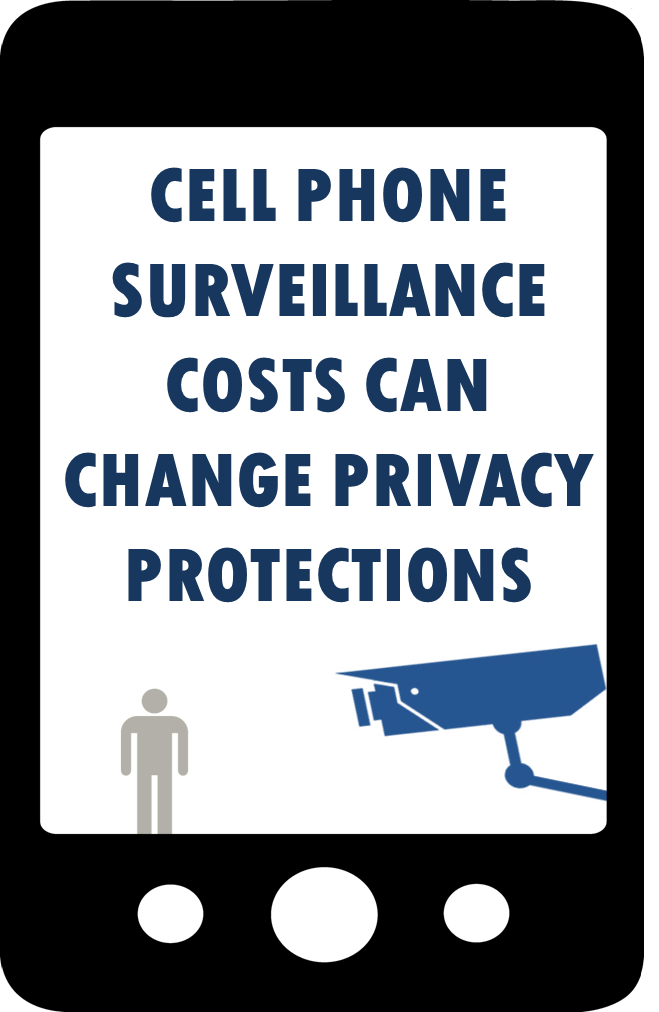 The United States Supreme Court has held that a person does have a reasonable expectation of privacy in their public movements. However, no specific rule has been announced as to when law enforcement surveillance violates this right. A Yale study found that the costs of surveillance can be as little as $.04 an hour. Decreasing costs of surveillance should trigger increased police surveillance under the Fourth Amendment otherwise there is too large of balance in favor of law enforcement over individual privacy rights.
The United States Supreme Court has held that a person does have a reasonable expectation of privacy in their public movements. However, no specific rule has been announced as to when law enforcement surveillance violates this right. A Yale study found that the costs of surveillance can be as little as $.04 an hour. Decreasing costs of surveillance should trigger increased police surveillance under the Fourth Amendment otherwise there is too large of balance in favor of law enforcement over individual privacy rights.
LAW, PRIVACY & SURVEILLANCE
The Fourth Amendment to the United States Constitution states:
The right of the people to be secure in their persons, houses, papers, and effects, against unreasonable searches and seizures, shall not be violated, and no warrants shall issue, but upon probable cause, supported by oath or affirmation, and particularly describing the place to be searched, and the persons or things to be seized.
In 2012, the United States Supreme Court, in United States v. Jones, held that government surveillance of a person’s movements for twenty-eight days using a GPS device violated reasonable expectations of privacy and constituted a Fourth Amendment search. Five of the Justices rejected earlier precedent that held a person could not have a reasonable expectation of privacy on their public movements.
YALE STUDY
![]() Technology has made the costs of surveillance extremely low. A recent Yale study, Tiny Constables and the Cost of Surveillance: Making Cents Out of United States v. Jones, found that the cost of nonstop surveillance has been reduced from an average of $275 an hour for a five-car “surveillance box” to, at most, $4.17 an hour, if tracked by cell phone. This is an enormous decrease making law enforcement seeking cell as a cost-savings measure. The cost of cellphone surveillance could be as little as $.04 an hour as the cell phone rate depends on the carrier.
Technology has made the costs of surveillance extremely low. A recent Yale study, Tiny Constables and the Cost of Surveillance: Making Cents Out of United States v. Jones, found that the cost of nonstop surveillance has been reduced from an average of $275 an hour for a five-car “surveillance box” to, at most, $4.17 an hour, if tracked by cell phone. This is an enormous decrease making law enforcement seeking cell as a cost-savings measure. The cost of cellphone surveillance could be as little as $.04 an hour as the cell phone rate depends on the carrier.
The Yale cost analysis helps show that technological-based techniques of surveillance may violate a reasonable expectation of privacy as set forth in US v. Jones and other cases as the costs are extremely low. The Yale researchers argue as the cost of surveillance decreases, the rights to privacy, under the Fourth Amendment, should be increased and there should be more scrutiny on cell phone-based surveillance. New legal tests for determining violations should be established the researchers argue because of how inexpensive surveillance has become.
The Yale authors conclude:
This Essay set out to make a targeted contribution to an ongoing conversation about how the Fourth Amendment’s protections can and should be applied to balance out the rapid technology-based expansion of the government’s power to collect information about its citizens. Our contribution is the suggestion that dollar cost can be a key metric for judging when such a radical shift in police power has occurred…
For now, our modest hope is to inspire an enterprising criminal defense attorney to articulate cost-based arguments when moving to suppress GPS or cell tracking data. Our less modest hope is to see that motion granted …
Source: Kevin S. Bankston and Ashkan Soltani / Yale Law Journal: Tiny Constables and the Cost of Surveillance: Making Cents Out of United States v. Jones – By:
CONCLUSION
It should be noted that the Fourth Amendment applies to surveillance by the government. It will be interesting to see what happens with regard to individual’s privacy rights under the Fourth Amendment especially in light of what we know, or think we know, about the NSA’s monitoring of cell phones.
I suspect that some lawyer will take make the argument the Yale study authors suggest and hopefully there will be a return to an appropriate balance between privacy and law enforcement surveillance.
